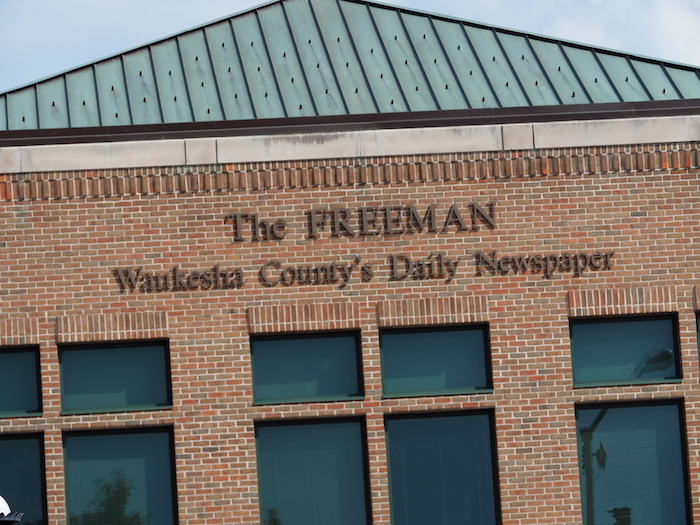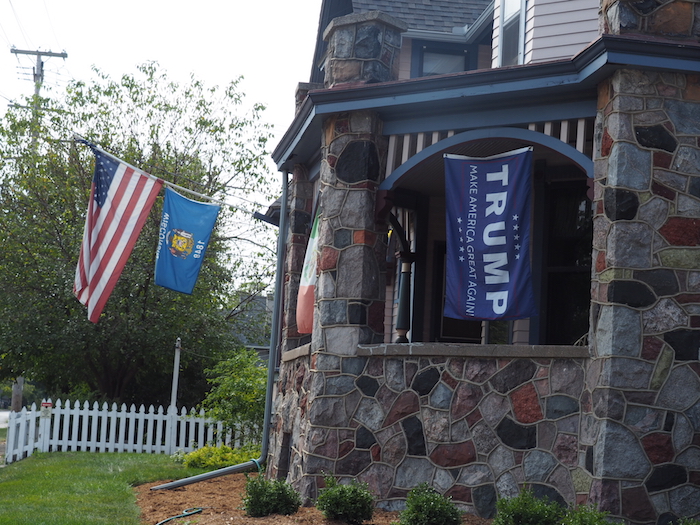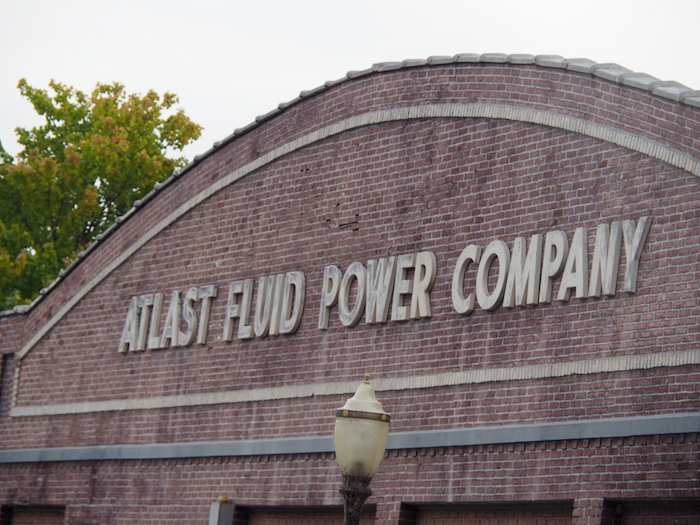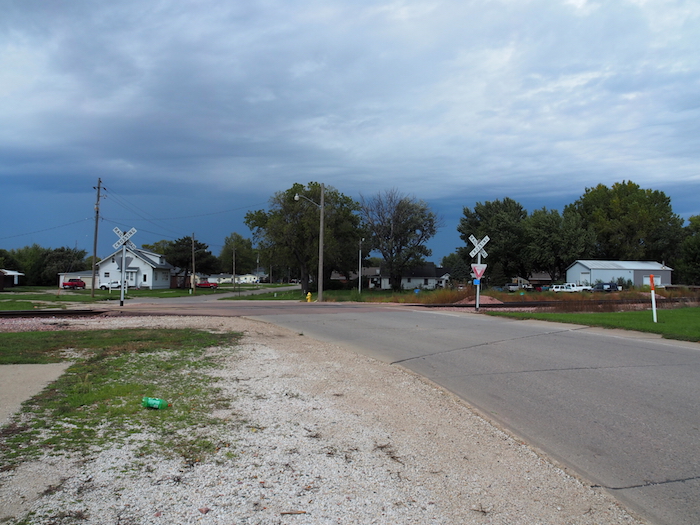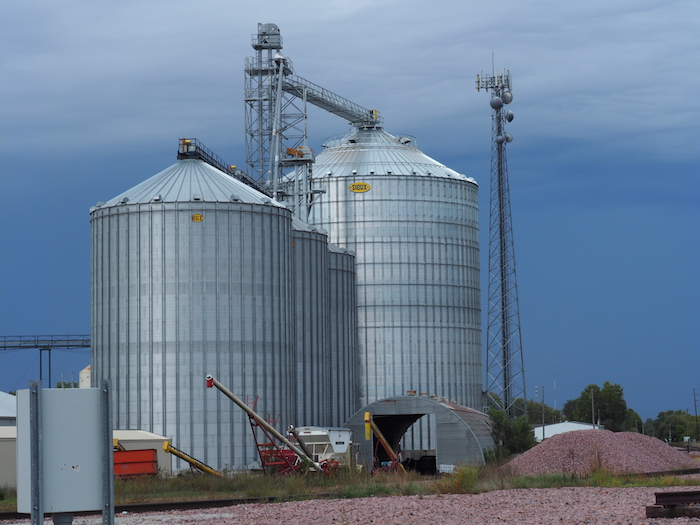- Waukesha’s newspaper
- A house in Waukesha
- An old factory in Dubuque
- View of Ms. River in Dubuque
- Street in Le Mars
- Oil storage in Sioux City
Until last week, I had never traveled anywhere in the Midwest other than Chicago. I was totally naive about the places, cultures, and people in the region. Fortunately, in my time in Waukesha, WI, Dubuque, Iowa, and Sioux City, Iowa, I had a chance to learn about what unites, and divides, people in the heart of our country.
The Flag in Waukesha:
When I arrived in Waukesha, President Trump had just said that players who kneel during the national anthem should be fired. While there, I made sure to ask people about their thoughts. Laura, a military veteran, told me that she fought for people to do “dumb things like that.”
Meanwhile, Terri, a self-described Christian woman, rejected the practice. However, her thinking intrigued me. Her rationale? “Use love to bring people to your side, not criticism.”
And finally, an artist I spoke with, who voted for Bernie Sanders, didn’t like that Kaepernick kneeled during the anthem. He did, however, support athletes’ right to protest. He said that he would love to see players kneel before the anthem, then stand up during it, as a protest of what’s wrong but also as a signal that they believe things can be better.
There’s been many words written about the protests and Trump’s statement about them. But what I found interesting in all of these interviews, from three people with very different life backgrounds, was that they all appealed to two ideas in our conversations. First, they talked about respect, both for the flag, and for someone’s right to kneel (and in their minds, disrespect that flag). Second, they were the first group I spoke with that consistently mentioned patriotism. In fact, the thing that has most surprised me so far is how few people think we need to “love” our country. In Waukesha, however, love and respect go hand-in-hand.
America in a city:
Although I’ve found that stereotypes people have about other regions in the country are wrong, one that isn’t wrong is that driving through Iowa is phenomenally boring. It’s flat, and there are almost no cars anywhere. My first stop after Wisconsin was Dubuque, a town on the Mississippi river.
Dubuque was unlike any place I’ve ever been. A city of roughly 58,000 people, there was more variety of people and culture than I anticipated. As a former factory town, it still has a blue-collar aesthetic and vibe. But with a large affluent, suburban population, there were also places that reminded me of Bryn Mawr; yoga studios, custom cupcake shops, and several nice coffee shops lined the main street. And in recent years, there has been a large influx of African-Americans from Chicago, and so the city’s cultural events and social hangouts are increasingly diverse, too. It was as if three core aspects of American life had been squeezed into 30 square miles.
Most of my conversations in Dubuque were fantastic. From Taj, a Sudanese refugee, who talked about the importance of community, to Brisa, a Trump voter, who said jobs are key to civic life, and Maddie, a non-voter who thought we need to be more humble as citizens, I learned about the complex intermingling between economics, the community, and the individual. As much as try to divorce these things, we can’t. Brisa is right that people’s opportunities, and their freedom to pursue them, are crucial for citizens and for the community’s well-being. Likewise, we can’t underestimate how important our individual attitude towards others is.
My Worst Experience Yet:
However, I also had my worst experience to date in Dubuque. During one interview, I heard the first rhetoric that I would say is actively harmful to civic community. The person told me that the one thing that all American high school students needed to know was that the Rothschilds and the Rockefellers had sought to undermine the country from within. He also said that the anti-fascist groups they funded were, and the groups that their relatives fund are, the real threats to American freedom.
These words alarmed me on two levels. First, it was trademark anti-Semitism. Fear of powerful, wealthy Jews is as old as time. It saddens me that it’s still rampant. Second, the idea that we should teach in schools that there is a group of people, whose only tie to one another is a religion, or a race, that actively wants to ruin our country means that we are saying some groups don’t belong. Given that many people I’ve spoken with describe America as a melting pot, we need to actively reject this type of thinking.
The Representative Midwest City:
As much as Dubuque taught me, Sioux City reflected the image I had in my mind of the Midwest. I also think it’s the consummate story of a place where opportunity is lacking, and people are desperate. A couple I spoke with both said that the “lack of opportunity” for young professionals is draining the city. And the husband said he voted for Trump because he thought America needed to return to its industrial roots.
As I drove around the area, what he said made sense to me. There were abandoned factories and few office buildings. The downtown was small. The people seemed sad, something the other two people I spoke with in Sioux City mentioned. The unifying forces in Sioux City – factories such as Gateway’s – had left. The place was still trying to figure out a way forward.
Unity and Division:
More than any segment to date, my time in the Midwest reminded me that for all we share, there are substantive. One man told me he sees Black Lives Matter as the equivalent of the KKK. Regardless of how one feels about BLM, the idea that white people are inferior to black people is not core to their mission (the way the reverse is central to the KKK’s work). But it says something that people now believe this to be the case. Another person told me he doesn’t see a future for people in his area. And as I walked around, I saw the way that community’s were faltering without jobs and hope.
And yet, most of my interviews reminded me that there is a way forward together. One might disagree with Brisa that Trump will create jobs. But I think it’d be hard to disagree with her sentiment that people deserve better chances and that we have to help. And Linda, a Clinton supporter, talked about the importance of knowing the First Amendment. Given the way we all scream about the other side’s abuse of free speech, I can’t help but agree with her that we might all need a refresher on speech, how it works, and why it’s important.
The challenge about division is that it’s easy to replicate, easy to be angry at those who are different or have had better lucky. But that’s exactly why need to be thinking about the things we do and can share.
